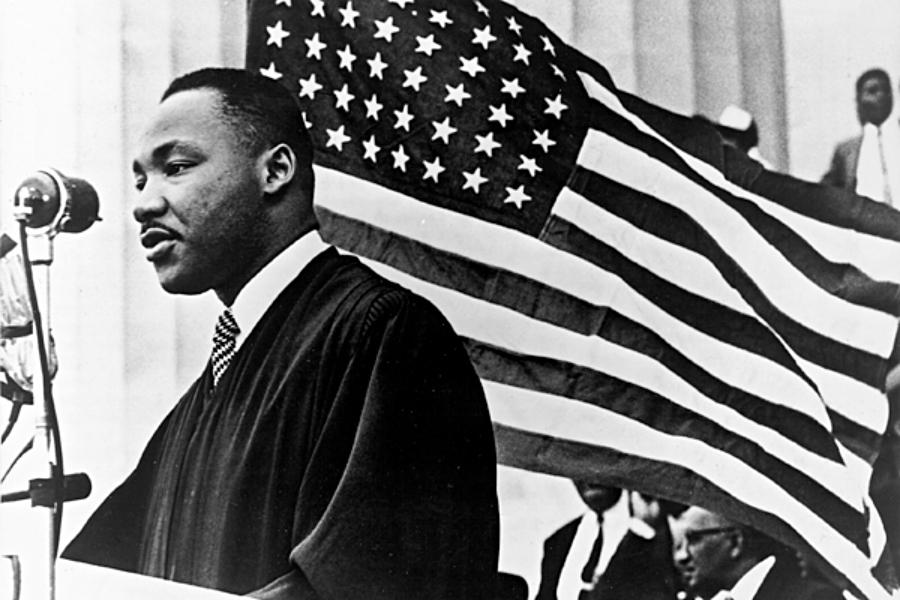MLK Day serves as a reminder of King’s life, work
January 15, 2016
Martin Luther King Jr. Day is a national holiday that was first observed 30 years ago — Jan. 20, 1986.
On this day, the nation pauses to remember the Rev. Dr. Martin Luther King Jr.’s life and work and also to honor the legacy King made for himself through his selfless efforts in bringing forth racial equality.
President Ronald Reagan signed the bill that made MLK day a holiday on Nov. 2, 1983. However, the holiday was not observed in all 50 states until Jan. 17, 2000.
MLK Day is celebrated on the third Monday of each year, keeping it around the time of King’s Jan. 15 birthday.
King made a monumental impact on the civil rights movement.
Becoming a civil rights activist at a young age, King aimed for a peaceful revolution that would bring forth the end of racial segregation.
There were many feats that King accomplished that set the stage for the progression of the fight for black rights.
The Montgomery Bus Boycott
First, King led the Montgomery Bus Boycott in 1955.
The idea of a bus boycott stemmed from Rosa Parks‘ refusal to give her seat on a Montgomery bus to a white man on Dec. 1, 1955.
Four days later, black leaders across Montgomery met to form the Montgomery Improvement Association, and the MIA elected King to be the group’s president.
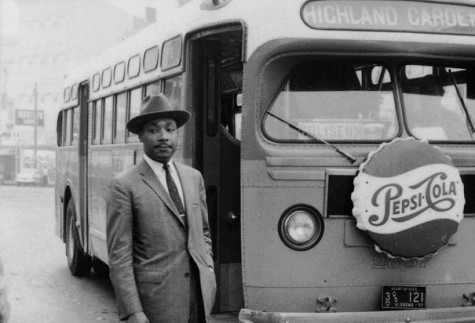
The Rev. Dr. Martin Luther King Jr. stands beside a Montgomery bus.
The boycott then began. Blacks were done with giving up their bus seats. They would not stop until the city called for full bus integration.
Montgomery was hurt by the boycott, but refused to budge on its bus policies.
On June 5, 1956, however, a Montgomery federal court ruled that any law requiring racially segregated seating on buses went against the U.S. Constitution’s 14th Amendment, which guaranteed all citizens equal rights and protection under the law.
Montgomery appealed this ruling to the Supreme Court, which, on Dec. 20, 1956, decided to uphold the federal court’s decision that segregation on buses is unconstitutional.
The buses of Montgomery became integrated on Dec. 21. The boycott lasted 381 days.
With his leadership of the MIA during the boycott, King earned himself a spot as one of the nation’s top civil rights movement leaders.
The boycott showed that King’s nonviolent approach to protesting worked, and the boycott remained a distinctive civil rights feat throughout the 1960s.
The Southern Christian Leadership Conference
Not long after that, King helped found the Southern Christian Leadership Conference and served as its first president.
When black citizens from cities across the country were starting up their own bus boycotts for integration, King, along with leaders of the MIA and other protest groups, met in Atlanta on Jan. 10 and 11, 1957.
We must come to see, with one of our distinguished jurists, that ‘justice too long delayed is justice denied.’ We have waited for more than 340 years for our constitutional and God-given rights.
— King, April 1963
Sixty people from 10 states decided to found the Southern Leadership Conference on Transportation and Nonviolent Integration (later changed to Southern Christian Leadership Conference), an organization that was to coordinate peaceful protest activities across the South.
King was elected president of the SCLC on Feb. 14, 1957.
The SCLC still exists today and is a group that rallies for the rights of all Americans and also fights to ensure economic justice and civil rights in the areas of discrimination and affirmative action.
The Birmingham, Ala., Campaign
The SCLC was especially influential in Birmingham, Ala., where its campaign rallied for the desegregation of the city’s downtown merchants.
The campaign began April 3, 1963, with coordinated peaceful marches and sit-ins.
Many of the campaign’s protesters were treated brutally by police forces and jailed.
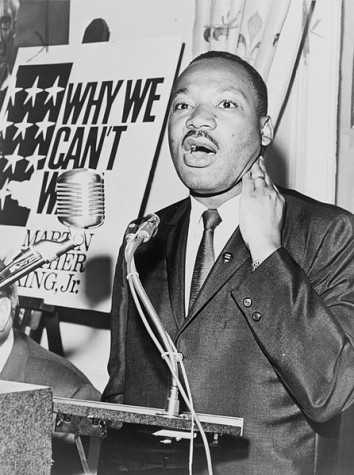
The Rev. Dr. Martin Luther King Jr. in 1964 promotes the book “Why We Can’t Wait,” based on his “Letter from Birmingham Jail.”
On April 12, King and SCLC activist Ralph Abernathy were arrested.
During this time, King wrote his “Letter from Birmingham Jail,” defending the strategy of nonviolent protesting.
In the letter, King wrote that the actions in Birmingham were “well-timed” and needed to be done to progress the struggle for civil rights.
“For years now I have heard the word ‘wait’,” King said. “It rings in the ear of every Negro with piercing familiarity. This ‘wait’ has almost always meant ‘never.’ ”
“We must come to see, with one of our distinguished jurists, that ‘justice too long delayed is justice denied.’ We have waited for more than 340 years for our constitutional and God-given rights,” he said.
Inspirational words from King, the letter rallied the civil rights activists of Birmingham.
Public outrage at the treatment of the peaceful protesters made President John F. Kennedy’s administration intervene and announce a settlement saying that downtown Birmingham businesses could no longer segregate races or exercise discrimination when hiring.
The March on Washington for Jobs and Freedom
After this, King helped organize the 1963 March on Washington for Jobs and Freedom, where he delivered his famous “I Have A Dream” speech, demanding the passage of a civil rights bill: The Civil Rights Act of 1964.
I have a dream that one day this nation will rise up and live out the true meaning of its creed: ‘We hold these truths to be self-evident, that all men are created equal.’
— King, August 1963
On August 28, 1963, more than 200,000 Americans rallied for civil rights, playing songs, praying, and giving speeches.
King’s “I have a Dream” speech inspired many people in the movement to keep on protesting for a new, integrated America.
Throughout the speech, King emphasized the need for the fight for civil rights and how the people of the movement could not turn to violence to get their points across.
“When the architects of our republic wrote the magnificent words of the Constitution and the Declaration of Independence,” King said during his speech, “they were signing a promissory note to which every American was to fall heir. This note was a promise that all men, yes, black men as well as white men, would be guaranteed the ‘unalienable Rights’ of ‘Life, Liberty and the pursuit of Happiness.’ ”
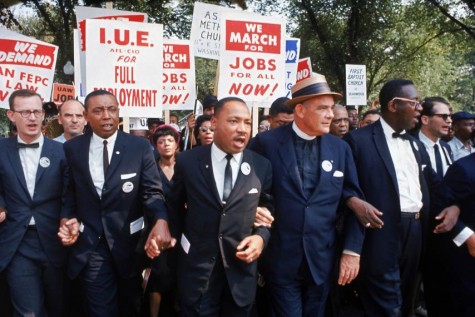
The Rev. Dr. Martin Luther King Jr. along with leaders at the March on Washington for Jobs and Freedom link arms in front of marchers.
It was during this time that King established his reputation as one of the greatest orators in American history.
The thing that sticks out to many people since King’s “I have a Dream Speech” is his approach to protest. He was an unwavering advocate for peace.
Mr. Rob Markwardt, history teacher, admires King’s nonviolent approach.
“(King) was able to keep the civil rights movement going in a positive direction,” Markwardt said. “Despite threats, even by the FBI (as they attempted to guilt him into suicide), King never wavered from his message. We should all learn to be steadfast in our convictions.”
The Selma to Montgomery March
After the March on Washington, in 1965, King and the SCLC organized the Selma to Montgomery March.
Even after the passing of the Civil Rights Act of 1964 that forbade racial discrimination in voting, many blacks were still being denied their right to vote.
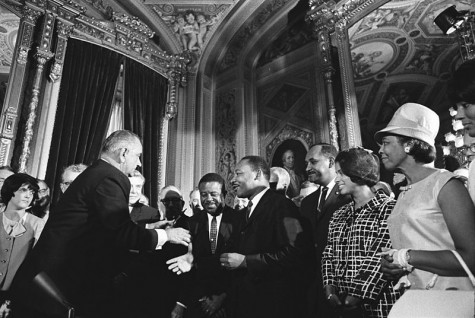
President Lyndon B. Johnson meets with the Rev. Dr. Martin Luther King Jr. at the signing of the Voting Rights Act of 1965.
The campaign for voting rights began with King and the SCLC choosing Selma, Ala., as their area of focus in registering blacks to vote.
In response to the murder of civil rights demonstrator Jimmie Lee Jackson in the nearby city of Marion, King and the SCLC decided to begin a mass protest march from Selma to Montgomery, a 54-mile walk.
After a few failed attempts, the Selma to Montgomery March finally took place March 21, 1965.
Around 2,000 people, protected by the Alabama National Guard and U.S. Army troops that President Lyndon B. Johnson had ordered, left Selma.
The protesters reached Montgomery on March 25, after walking for about 12 hours each day.
In August 1965, Congress passed the Voting Rights Act, guaranteeing black Americans the right to vote.
King’s Legacy
During his lifetime, there were many things King did that helped with the progression of the civil rights movement.
King received the Nobel Peace Prize Oct. 14, 1964, for his acts in non-violently combating racial inequality, marking him as the youngest person to receive the award at that time.
His life was cut short, however, when King was assassinated in Memphis, Tenn., while planning a national occupation that would take place in Washington, D.C., to be called the “Poor People’s Campaign.”
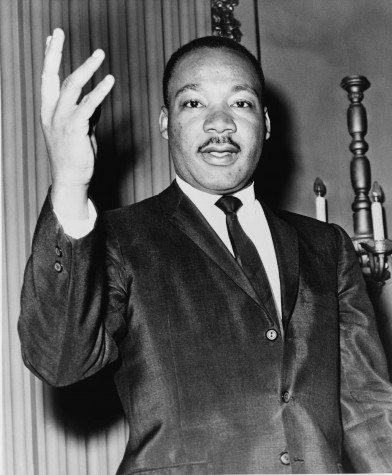
The Rev. Dr. Martin Luther King Jr. speaking in 1964.
Just days after King’s assassination, Congress passed the Civil Rights Act of 1968 (commonly known as the Fair Housing Act), prohibiting discrimination on the basis of race, religion, or national origin in housing and related matters.
Mr. Ed Councilor, history teacher, thinks that King was a great man that gave his life for the betterment of all people.
“(The thing I like about King is) his courage that he demonstrated in the face of physical danger,” Councilor said. “He never forgot the goal he was fighting for. He knew if he reacted with violence in the face of violence, he, and most importantly, his goal of equal rights, would fail.”
King was a huge influence to the civil rights movement.
“It was (King’s) strength and convictions that led to the political, economical, and social goals that were achieved,” Councilor said.
Although students may look at MLK Day as simply a day off from school, the feats King accomplished during his lifetime are something more to think about.
When asking students what makes King so important, the answers were pretty similar: King was, simply, influential.
Senior Zeric Hutchinson admires King and what he did during his lifetime.
“(King) was a great man that moved a lot of people, changed a lot of things, and died for what’s right,” Hutchinson said.
For more information about King, you can read The Eclipse’s story MLK Day honors King’s dream, legacy.
